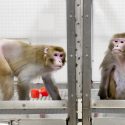Monkey generosity: No strings attached
Among monkeys that split child care responsibilities, sharing extends to dinnertime, but grudges do not, according to research published July 14 in Proceedings of the Royal Society B.
Pairs of adult cottontop tamarins will share food, upholding the cooperative breeding hypothesis that expects members of species that share the burden for raising young are also motivated to help each other in other ways.
“A big issue in terms of evolution has been how humans — or any social animals — developed altruism,” says Charles Snowdon, a psychology professor at the University of Wisconsin–Madison. “The argument is that altruistic animals are either helping kin or helping in expectation of future return.”
In the case of cottontop tamarins, Snowdon and former psychology graduate student Katherine Cronin had earlier found an absence of the food-donating altruism that had been seen in other in cooperatively breeding species such as humans and marmosets. But Cronin and research assistant Kori Schroeder developed a simpler series of tasks that measured how the small monkeys’ propensity for sharing changed over time.
Adult tamarin pairs — “Like human married couples, not related but together for a long time,” Snowdon says — were placed in a situation in which one of them appeared to be either donating food to or withholding food from the other.
The researchers then turned the tables, giving the recipient tamarin real control over a drawer that could provide a piece of a favorite food to its (recently generous or miserly) partner without any reward for itself.
“Initially, the tamarins were put off by having been denied rewards by their partner,” Cronin says. “They reacted by providing less, in turn. This reaction didn’t last long, however.”
Over the course of five minutes, the researchers found, the study tamarins were feeding their mate the same amount of food no matter their recent sharing history.
“Because the tamarins form lifelong bonds with their partners, it makes sense that they don’t hold grudges for too long,” Cronin says. “They’ll make a more successful pair if they help each other out.”
“What that’s suggesting is it’s not direct reciprocity,” Snowdon says. “What the tamarins are showing is something akin to altruism, and it’s independent of whether they were treated well or poorly by their mate.”



